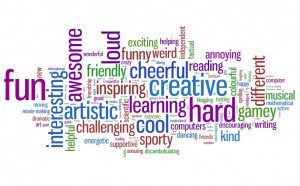 “Your kids use words even I don’t know.”
“Your kids use words even I don’t know.”
We’ve heard that comment from numerous people over the years, starting when our kids were still in single digit ages. Versions of the statement come from aunts, uncles, neighbors and even English teachers.
It’s not magic or even education, really. It’s fun. Encourage your kids to have fun with words and they will. Only later will they suspect that it was really a clever ruse to expand their vocabularies.
It’s more than just fun, of course. The number and variety of words your kids hear growing up is correlated with academic achievement.
So start young. Read aloud to your kids and use a variety of good books. Include classics from Dr. Seuss and Shel Silverstein where the rhythm and inventiveness of the words matter. That will prime them for stories that you make up on the spot and let them finish.
“Then he opened the door, and do you know what he saw there?”
“A giraffe.”
“Exactly. A giraffe. A big giraffe with a funny name. Do you know what it was?”
“Englebert.”
“Uh, yes. Englebert. Englebert the giraffe. From Dusseldorf. He was on his way to the train station…”
From there, you can graduate to rhyming games around the dinner table.
“I put the broccoli on your plate.”
“Are you sure it’s not a skate?”
“No but if I move it here I think it is checkmate.”
“Enough of this. Time for dessert. I can’t wait.”
Dribble in words they do not understand and they will ask about them. Why wouldn’t they, it’s a game after all? Creating curiosity about words and then satisfying it – or the old trick of letting them look it up themselves – gets them engaged with words. It’s like giving them a new ball. They will want to metaphorically throw it again and again.
Another game we play – and those who have been students with Cicero’s Academy™ will recognize this one – is word association. You start with one word and see how many words you can come with that are like it. Usually, it starts with just synonyms, essentially replacing the word with others of similar meaning. But, you will eventually start broadening from the original word or find a bridge term that takes the stream of words in a new direction. Throw in some words of your own to expand their vocabulary further.
As your kids get older, the games can get more sophisticated. Another game we play in workshops is holding a conversation entirely via questions.
“How are you today?”
“Who wants to know?”
“Why are you so grumpy?”
“Have you ever gotten up on the wrong side of the bed?”
“Don’t you hate it when that happens?”
Try this. It is not easy to do on the fly. You have to actually think about what you’re saying and transform declarative sentences in your head into their equivalents in questions – all within the time span of a normal conversation. It teaches dexterity and agility with words, syntax and sentence structure.
In other words…make it fun and you give them more than just a vocabulary. You give them a lifetime of learning.